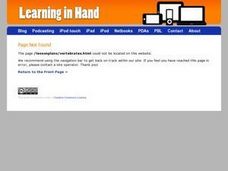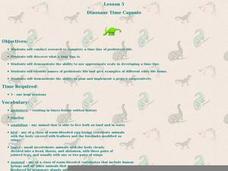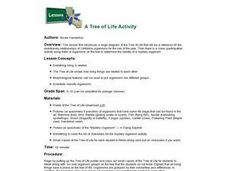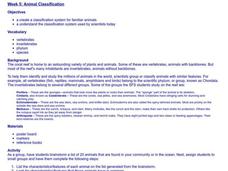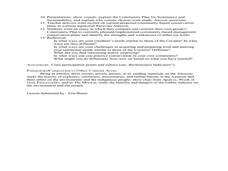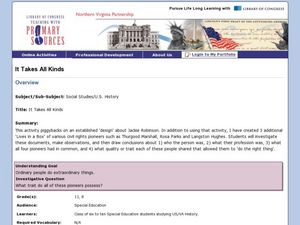Curated OER
Animal Alphabet
Second graders identify animals with each letter of the alphabet. In groups, they create a PowerPoint presentation which shows the information they have collected about each one. Using all of this information, they create an animal...
Curated OER
What's Wild
Third graders discover the differences between wild and domestic animals. In this animal lesson, 3rd graders chart the differences in the animals and look through magazines for pictures of wild and domestic animals to glue to a poster....
Curated OER
Vertebrates are Cool!
Students conduct research on various vertebrates. They read the eBook 'Vertebrates,' select a vertebrate, conduct research, and create an eBook with one photo about their chosen vertebrate.
Curated OER
Quiz
In this quiz worksheet, students, after researching and discussing different types of world-wide animals, determine the answers to ten key true and false questions.
Curated OER
Classy
Students explore the classification system in this seven lessons unit. The diversity of life forms and their characteristics are examined using a microscope. Kingdoms, classes, and families are investigated.
Curated OER
Dinosaur Time Capsule
Third graders research prehistoric life using educational software. They design a prehistoric life while showing the use of appropriate scale and names for the prehistoric life. They follow an internet link to participate in a virtual...
Curated OER
A Tree of Life Activity
High schoolers solve a mystery of the identification of a unknown organism by comparing its morphological characteristics to those in a tree of life classification poster. They compare the observable characteristics of the specimen and...
Curated OER
Everything in Its Place: Science Classification
Students investigate the system of classification for living things through the sixteen lessons of this unit. The five kingdoms of monerans, protists, fungi, plants, and animals form the basis of several experiments as the similarities...
Curated OER
Animal Classification
Students list characteristics and features of animals found in their community. They then group the animals according to how they are similar and different and create names for each group. They then create a chart of their...
Curated OER
Habitat for Sale
Learners are able to define habitat, and identify the four things that living things need to survive. They are able to describe how living things are adapted to their habitats.
Curated OER
The Life Cycle of the Butterfly
Second graders study the life cycle of a butterfly by observing metamorphosis taking place in a butterfly pavilion. Students illustrate their understandings of the body parts of a caterpillar and butterfly, as well as the life cycle,...
Curated OER
Do You Have the Key?
Students practice using a dichotomous key. In this classification lesson, students read an article about scientific exploration and identification of new species. They use a dichotomous key to identify objects and create their own key.
Curated OER
Supermarkets, Sustenance and Sustainability
Students investigate jungles and the people who depend upon them. In this sustainability lesson, students research wild life conservation and discover the importance of a jungle to Amazonian people. Students create a group presentation...
Curated OER
It Takes All Kinds!
Students view video clips and observe similarities and differences between animals. They sort animals into groups for a zoo. They make a graph of their observations and review scientific classifications.
Curated OER
States and Territories: Vocabulary Follow-Up
In this states and territories worksheet, students fill in blanks in sentences, using given vocabulary words at the top of the page. A reference web site is given for additional activities.
Other
Science4 Us: Animals
In online and offline activities, students broaden their understanding of animals by learning to identify and classify animals into six categories: mammals, birds, fish, amphibians, reptiles, and invertebrates.
E-learning for Kids
E Learning for Kids: Science: Caribbean Sea: How Can We Classify Animals?
Welcome to Hideaway Island where five pirates need to find crews for their ships. Join in and learn about animals with backbones.
ClassFlow
Class Flow: Animal Classification
[Free Registration/Login Required] Students will classify organisms into groups and relate how they determined the groups with how and why scientists use classification. They will also demonstrate how animals are sorted into groups...




